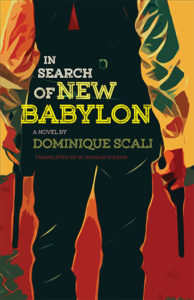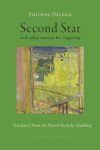 [Talonbooks; 2017]
[Talonbooks; 2017]
Tr. by W. Donald Wilson
“Well, what do you think makes him act that way?” asked the cowboy.
“He’s frightened.” The Easterner knocked his pipe against the stove. “He’s frightened right out of his senses.”
“At what?” asked Johnnie and the cowboy together.
“I don’t know, but it seems to me this man has been reading cheap novels about the West, and he thinks he’s in the middle of it—the shooting and killing and all.”
“But,” said the cowboy, deeply shocked, “this isn’t a wild place. This is Nebraska.”
“Yes,” added Johnnie, “and why doesn’t he wait until he really gets out West?”
The traveled Easterner laughed. “Things aren’t bad even there—not in these days. But he thinks he’s right in the middle of hell.”
Johnnie and the cowboy thought for a long while.
“It’s strange,” remarked Johnnie at last.
— “The Blue Hotel,” Stephen Crane
Stephen Crane’s 1898 short story “The Blue Hotel” can surely be read as a Revisionist Western avant la lettre. As a piece of fiction that is undeniably concerned with a metadiscursive moment of writing within and about a genre only to deflate its popul(ar/ist) inner cohesion, it certainly demonstrates Crane as heavily invested in probing the formal conventions of naturalism, marking the pinnacle of his proto-modernist stylistic excursions. Yet what I have always found so unshakeable about the story is Crane’s stubborn insistence to ultimately not revise a damned thing, to leave us in the end with precisely what we thought had been irrevocably dismissed. The Swede (the anxiety-ridden visitor to the small Nebraska inn who is convinced his fellow guests will surely murder him) acts as the voice of an anti-heroic quixotism, fearing that all those dime novels of bandits and lumpen gunslingers have been written as incontestable, first-hand travelogue. A lingering myth of ever present danger seems to drive the Swede to near madness: he’s convinced one of his fellow compatriots has been cheating him.
The Swede does what a Western dictates he must: he starts a fight about it. After slinking out of The Blue Hotel to a local bar, he encounters a gambler who refuses his company. A momentary misunderstanding “and a human body was cut as easily as if it had been a piece of fruit.” The violence arrives but with no set piece, just pulpy flesh transmogrified to fleshy pulp in an instant. The story concludes. The Swede had in fact been cheated at cards back at the inn. And in Crane’s West—the one that is not a wild place but is Nebraska—the possibility of violent death remains all too easily realized, it only does not look quite so extraordinary: no chase, no bullets exchanged, no great myth evoked, no moral derived, no reconstitution of the socius, no rebirth through violence, no new Adamism. We find a quiet, professional gambler murdering a verbose stranger and walking home.
“It’s strange.”
Much like the horrific West of sensational lore imagined and subsequently manifested by Crane’s Swede, Dominique Scali’s In Search of New Babylon gives us a vast swath of America during the mid-nineteenth century — “right in the middle of hell.” Translated from French, Scali’s 2015 novel reflects the ethos of her author bio: “an author and journalist who is nostalgic for bygone eras she can experience only in her imagination.” This imagination conjures the West up as an amalgamation of equal parts post-apocalyptic wasteland and detail-riddled realism.
Regardless of the particular intricacies of place which Scali occasionally goes to great lengths to describe, the conclusion holds true of every place: New Babylon can never hope to be built when it is already extant everywhere. The novel opens on a family homestead in the now ghost town of Paria, Utah with the description of “three long guns . . . in a place of honour to the left of the chimney piece.” Each gun signals a moment in a familial chain of men at war: the great-grandfather in the Revolutionary War, the grandfather in the Mexican War, and the father in the Civil War. While the technics grow more efficiently deadly with each subsequent iteration, each gun also signals a repetition of the past echoing off of the canyon walls in the present, all of these loaded weapons “ready to be used again and again.”
This genealogy of American violence suggests the West as an extension of a mechanism long set in motion, always going to break in the singular, inevitable way it could have. This family appears born into it, condemned to a “harsh landscape” wherein “the only possible threat was a human one.” Beginning in media res, Scali presents an environ locked into its place by long running historical processes, bound up in blood. Amid the catalogue of guns, however, there remains a noticeable absence, the most common marker of repetition in the Western canon, the repeating rifle: “The Gun that Won the West,” a genre staple. In Search of New Babylon’s collection of weaponry signposts a past already too far passed (since by 1881 Winchester had already been selling repeaters for some fifteen years. Lingering within this missingness is a trope the novel will explicitly circle and come back round to unceasingly— something novel can be worn out even before its first instantiation. Like the ten hangings and endless signatures of Charles Teasdale, the thirty fake weddings of Pearl Guthrie, the hundred murders of Russian Bill, and the four notebooks of Reverend Aaron, repetition is endlessly draining, but even so, the compulsion to relive and retell and rewrite the same stories, again, has the potential to reveal how easy it is to forget; however, even in that moment we go looking for the origination, a moment posited as germinal oft appears little more than bathetic.
In Search of New Babylon structures itself around these four characters and their respective histories of compulsive recurrence: Teasdale, a pyromaniac and amateur boxer who tries to get himself killed and fails so many times he must take up the task himself, Pearl, a young woman from Shawneetown, Illinois who wants to go out West in order to find a husband but decides to wait for a perfection she knows will not manifest itself, Bill, neither Russian nor a murderer except for his drunken revelation that his failed engineering project may have in fact led to the death of hundreds, and the Reverend, not a preacher at all but rather a writer hiding his identity so as to record and romanticize the lives of figures in the West he deems exceptional. While the Reverend (with Pearl as his necessary amanuensis after he’s had his hands chopped off) ostensibly serves as narrator, it’s Teasdale’s aphoristic interludes (found in a box Pearl stole from him), that stand out. A third of the way in, we find from Teasdale: “Sometimes there’s no difference between always moving on and going in circles. Like everyone, I’m here because I wanted to live a thousand lives in one, but I ended up living the same one a thousand times over.” But what exactly Teasdale as well as the other characters search for in In Search of New Babylon remains impermeably opaque.
In John Ford’s The Searchers, Ethan Edwards is directed by an Ahabian monomania, obsessively going in circles so as to eventually satisfy his racist impulses; here in this novel, the characters wander for no reason whatsoever, the West serving only as a backdrop to be filled or emptied of peoples at will, a piece of scenic carpentry to restage the same shoot of drifters (of course) drifting: “‘Poor child,’ she’d say to me. ‘You think you’re going somewhere. The desert is everywhere. The desert is just repetition.’”
The novel succeeds as a Western. It has a vast number of the cues, reshuffled perhaps, but with enough rugged individualism, or maybe just anti-collectivism of any and all sorts, and a gruffness to clearly operate within the genre. But whereas Crane succeeds in making the Western strange, Scali’s text often reads as estranged. That movable Western backdrop lacks a background of the central motivations for these repetitive acts of violence: accumulation via Native dispossession, imperial genocidal impulses, racial capitalism, and massive corporate financial growth. This West is populated by myth but a myth devoid of any large scale forces operative in the wings. Within In Search of New Babylon, the violence remains atavistic, lacking any motivation or compulsion, no superstructural narrative concerns to scale it up, giving its materiality an empty, cold register. This bleak vision portrays a world wherein singular people come into contact with one another only to disappear again. I note these things not to necessarily suggest them as the novel’s failures but largely to suggest its limits, and by virtue of these what lies outside of its purview. On the terrain the novel builds for itself, it comes off masterfully, in sharp, terse prose and compelling movement. For a work so concerned with repetition, it remains marvelously paced, with an unerring sense of momentum even as it often moves non-synchronously. And although the characters certainly come off as well-worn types, they rarely find themselves within the realm of cliché. The estrangement is, for better or worse, a technique for establishing a tone and creating a world, and In Search of New Babylon possesses a striking stylistic consistency in both categories even if it remains affectively muted and monochromatic. The alienation produced by this unrestrainable entropy though, keeps a sense of collective action forever at bay. The novel gives little room for us to observe the ways in which domination and resistance in the American West did not revolve around lone figures. As Crane writes at the end of “The Blue Hotel”: “Every sin is the result of a shared effort.”
Clint Williamson is a PhD Candidate in English at the University of Pennsylvania
This post may contain affiliate links.







